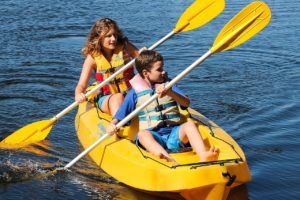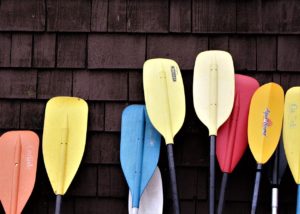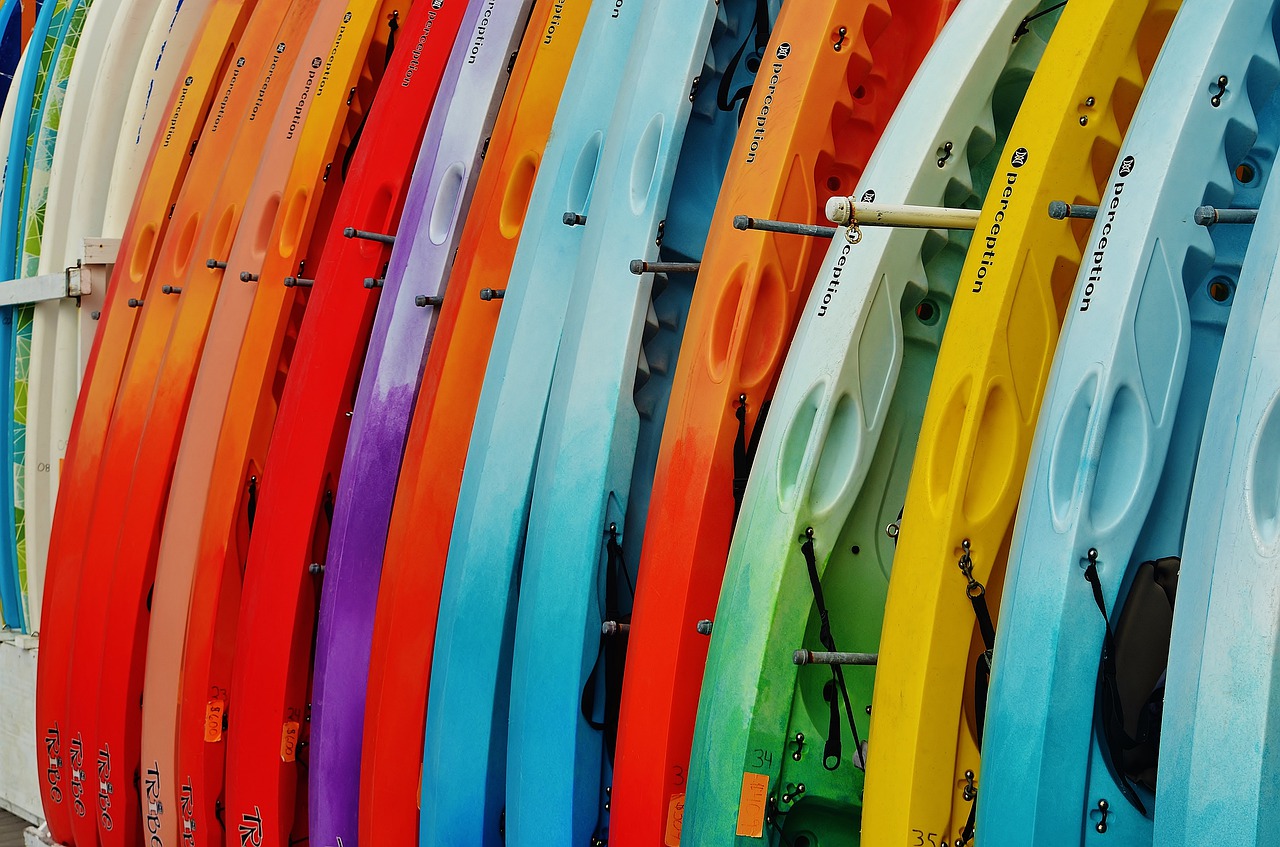Need some outdoor exercise but still want to practice social distancing? Go paddle a kayak.

Flatwater kayaking on Yarmouth’s coastal waterways offers a welcome break from the home office – complete with the aroma of salty air and a chance to spot egrets, osprey and great blue herons. Best of all, you can do it from the cockpit of your personal, human-powered watercraft, keeping a safe distance from other paddlers.
Kayaking is also a wonderful low-impact workout. Even leisurely paddling exercises the core and upper body muscles, while offering moderate aerobic benefits. Depending on wind speed, currents, your weight and other variables, kayaking will burn roughly 200 to 450 calories per hour.
The sport is inexpensive, family friendly, fun for kids and, yes … some people even take their dogs out with them. Lightweight kayaks are easy to move and can be transported longer distances on the roof of a car. But you won’t have to travel far to find great paddling places on Cape Cod – especially in Yarmouth, which maintains numerous public boat launching areas. Finally, if you want to try the sport without buying a kayak, you can do that, too.
Bass River Kayaks & Paddle Boards, located on the east bank of Bass River at 118 Main Street, West Dennis (next to Sundancer’s), will rent you a kayak, deliver it and pick it up when you’re finished, says co-owner Ashley Smith. There are limitations to the local deliveries, which you can find – along with the store’s rental rates and hours of operation – at the Bass River Kayaks & Paddle Boards website. The physical store is preparing to open on May 23, if allowed under statewide COVID-19 policies, Smith said. But even if the physical store is closed, rentals and deliveries are still available by phone (508) 362-5555.
You can also rent a kayak and use it right on Bass River, Smith says, noting that Cape Cod’s longest river is a superb location for beginners.
Bass River is roughly 6 miles long, stretching from Mill Pond in Yarmouth Port to Smuggler’s Beach on Nantucket Sound, with numerous saltwater ponds and coves for quiet exploration. The Cape’s flat terrain makes Bass River easy for paddling in most locations, with no rapids or whitewater. But the river is a tidal waterway, Smith explained, meaning water flows upstream on an incoming tide and back downstream after high tide, changing direction every six hours. Paddlers can take advantage of the currents by planning their upriver trips on an incoming tide and taking a break for lunch before paddling back downstream once the current turns. Some other practical kayaking tips from Smith:
- Always paddle with another kayaker and wear a life vest. The Coast Guard requires a life vest for each occupant of a boat, and for kayakers, it’s best to actually wear the vest instead of keeping it stashed onboard.
- Even though the air temperature may be 70 degrees, the water temperature is still quite cold in May and early June. Staffers at Bass River Kayaks & Paddle Boards advise boaters to wait until the water temperature reaches at least 55 degrees F. And don’t venture too far from shore when the water is cold. You can call the kayak store to ask about water temperatures, tides and wind conditions or check one of the many websites that publish local water temperatures.
- Keep close to the riverbanks. Not only will you get a better view of nature, but you’ll stay out of the channel and away from motorized watercraft. More precisely, motorboats navigate between the red and green channel markers, so kayakers should strive to stay between the shorelines and the marked channels. Also note that motorboats have the right of way (and they can’t slam on the brakes if you cut in front of them).
- For easier paddling and calmer water, keep to the lee or sheltered side of the river. The calm water also makes it easier to see the bottom.
- Carry a waterproof dry bag with clothes and a few necessities – just in case. Kayaks are much more stable than canoes, but accidents can happen. If you do get wet, you can reach into your waterproof bag for dry clothing. Sunscreen and bug repellent are also recommended.
- Pack some snacks and drinking water. If it’s hot, you’ll need the water to stay hydrated, and you might want to stop for a picnic. Plus, if you have an emergency during your trip, the cell phone will come in handy. The Coast Guard also requires boaters to carry a sound-making device (kayakers can get by with a loud whistle on a lanyard).
- Watch for heavier currents under bridges, where waterways narrow like a funnel. North of the Highbank Road Bridge on Bass River, paddling can be a little tricky when the current is running at its peak.

Some prime paddling spots along Bass River: The mile-and-a-half stretch from Route 28 south to Smuggler’s Beach on Nantucket Sound has lots to see – including osprey nests, egrets, cormorants and great blue herons. The West Dennis Fingers, on the Dennis side of the River, is a series of boat canals with beautiful homes. Heading upstream, Grant Cove is a nice spot for exploring quiet coves and inlets. The cove is also close to Wilbur Park in Yarmouth, where you can park a car.
Beyond Bass River, paddlers might want to explore Parker’s River, Swan Pond, Long Pond, Lewis Bay or other locations. Freshwater boat launches are found on Long Pond (at the end of Davis Road) and on Dennis Pond (off Summer Street) to the north, you can try to find the Bass Hole and Gray’s Beach site in Yarmouth Port, although the water gets shallow at low tide. Find a map of Yarmouth’s saltwater boat ramps at the town’s Division of Natural Resources Website.
Be aware that there are some new pandemic-related rules for Massachusetts boating ramps, according to Yarmouth Natural Resources Director Karl van Hone. The state now requires face masks and social distancing at public boat ramps. Other rules include no loitering or gathering at boat ramps for fishing tournaments or other activities and keeping boat occupants to members of the same family (not a problem with single-person kayaks). Find complete rules at the state Department of Fish and Game.
Andy Tomolonis is a nonfiction author, travel writer and multimedia journalist.

